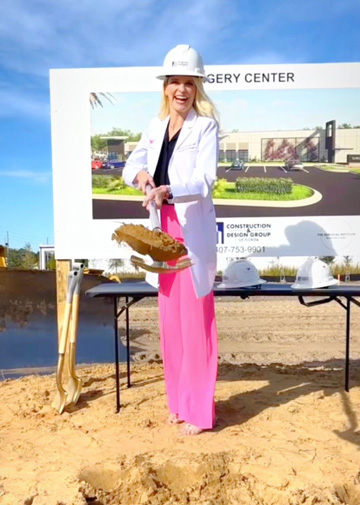- Home
- Article
Starting a Movement
By: Jared Bilski | Editor-in-Chief
Published: 4/1/2024
Dr. Elizabeth Dovec sets her sights on bringing bariatric surgery to ASCs... starting with her own.
The first time Elizabeth “Betsy” Dovec, MD, FACS, FASMBS, DBOM, performed a laparoscopic sleeve gastrectomy in an ambulatory surgery center setting, she went to check on the patient in post-op only to discover something extremely unexpected.
“I came back and asked, ‘Where’s the patient?’” recalls Dr. Dovec, founder, creator and CEO of BodyByBariatrics, which offers comprehensive surgical obesity treatment options. When staff informed her the patient left less than two hours after surgery, she was shocked by the efficiency of the process. Although she’d performed same-day procedures at the hospital, Dr. Dovec had never seen a patient discharged in less than two hours.
That inaugural surgery center case was performed in 2019 at a small ASC with one OR and one procedure room about 20 minutes from the Baltimore-area hospital in which Dr. Dovec worked. For the next two years, she’d spend one or two days a week at the ASC, gradually increasing the types of bariatric procedures she performed to include laparoscopic Roux-en-Y gastric bypass and revisional bariatric surgeries — including laparoscopic sleeve revision with conversion to gastric bypass and laparoscopic removal of adjustable gastric band with revision to a gastric bypass — until she was performing upwards of six procedures per day. “I didn’t have a financial stake in this surgery center, but I embarked on a journey that enriched my expertise immeasurably,” she says. “Over the next two and a half years, this experience gave me an invaluable clinical insight: The key to success lies in managing patient expectations.”
During this pivotal time, Dr. Dovec established herself as one of the premier bariatric surgeons in Maryland, leading a comprehensive weight management program averaging 1,400 cases annually, with the majority of her volume same-day cases in both hospital and ASC settings. She was eventually recruited by AdventHealth to establish and operate a bariatrics program at its Orlando, Fla., campus, the second-largest hospital in the country.
“Patients would have their surgery and then go home that day, but everything was taking place in the hospital setting,” she says. “About a year into my contract, I went to leadership and said, ‘We need to build a surgery center for these cases to increase access to care and improve the patient experience.’” Dr. Dovec even talked with her hospital about the possibility of entering into a partnership to create an ASC dedicated exclusively to the outpatient cases she performed in the hospital. AdventHealth, however, declined.
That left Dr. Dovec with a decision to make: Stay with a well-established health system and continue to perform cases in a hospital setting or go off on her own to create the type of surgery center she strongly believed would serve as the future of outpatient bariatrics. Dr. Dovec chose the latter.
New chapter

Although parting with her former facility was a traumatic experience, Dr. Dovec calls the six months that followed the best thing that ever happened to her. “I got my paycheck, I got my benefits, and I had the gift of time,” she says. “I used those six months to write the business plan and create the pro forma to build the surgery center. I found the land, the contractors, the architects and took the time to understand AHCA [the Florida Agency for Health Care Administration].”
A business plan is one thing, but navigating the myriad obstacles and red tape involved in bringing a surgery center from conception to fruition is something else altogether. “I went in thinking, ‘I can do this,’ but I grossly underestimated everything that goes into building a surgery center. It’s a behemoth of a project,” admits Dr. Dovec. Still, she pushed forward by focusing on what was on the other side of the finish line.
“I have this steadfast vision that this center needs to be a first-of-its-kind ASC focusing on bariatric surgery and GI services,” she says. “No one has ever leaned into bariatrics to this extent.” Dr. Dovec and her team broke ground on the surgery center in December 2023 and expect to be up and running by January 2025. “We’re looking at less than one year before this thing is a reality,” she says.
Misconceptions, reimbursement challenges
There are a few reasons why no one has leaned into bariatrics in an ASC setting. For starters, a significant number of providers claim these surgical procedures are simply too risky — potential airway issues, obstructive sleep apnea, the possibility of bleeding, etc. — to perform on morbidly obese patients in a surgery center.
While Dr. Dovec freely admits that certain bariatric cases need to be performed in a hospital setting — patients who are non-compliant with their CPAP, patients with a significant cardiac and pulmonary history, clotting disorders or anesthesia issues — she strongly disagrees with the blanket assessment that bariatric patients are unfit for same-day surgery.
“In the properly selected patient, individuals undergoing bariatric procedures are probably healthier and more optimized than a lot of other surgeries being done in an ASC setting,” she says. “These patients don’t need to stay in the hospital. By keeping surgery times under an hour or two, initiating early mobilization, and closely monitoring postoperative hydration and urinary output, we can optimize outcomes and facilitate a smooth recovery process.”
The properly selected patients for Dr. Dovec tend to be mostly females in the 25-45 age demographic with a BMI between 40-45 who have controlled high blood pressure, hypercholesterolemia and/or diabetes. Dr. Dovec backs up her claims with data. In fact, she wrote up her first 500 cases as true same-day discharges and completed the first paper ever on same-day discharges for sleeve, gastric bypass and revisional bariatric surgeries.

There’s also a financial component at the heart of migrating same-day bariatric cases to ASCs. CMS still has bariatric surgeries coded as inpatient-only procedures, and some in the industry are determined to keep it that way for as long as possible. But Dr. Dovec believes it’s only a matter of time before the tide turns. “What we’re about to witness with bariatrics is what happened with orthopedics five years ago,” she says, referring to CMS’ steady removal of inpatient-only codes for ortho cases ranging from total hips to total knees to, just this year, total shoulders. “By 2030, CMS wants 100% of Medicare beneficiaries on a value-based arrangement, and surgery centers are the only way to consistently provide high-quality care at a low cost.”
Dr. Dovec envisions a time in the near future when bariatric surgery will join other surgical specialties that are predominantly performed in ASCs — and she hopes other surgeons and practices will join her in moving that needle. “In a surgery center environment, we as bariatric surgeons should take control of the narrative for the first time in a way that we have never allowed ourselves to do,” she says. “We should demand a seat at the table. We’re the ones performing these procedures. We’re always focused on quality first and foremost, but we’re also cost-conscious to make sure that we can improve access to care for those who need it.”
Dr. Dovec isn’t alone in her beliefs about the future of her chosen service line. Bill Prentice, CEO of the Ambulatory Surgery Center Association, also expects same-day bariatric procedures to follow the trajectory of other specialties now predominantly performed in surgery centers. “We have every reason to believe that the advancements in clinical techniques and pain management that have allowed so many other procedures to move to the outpatient setting in recent years will permit bariatric surgeries to migrate as well,” says Mr. Prentice.
In the meantime, Dr. Dovec is prepared to build her center through strong marketing, word-of-mouth, self-pay patients and superior bundling arrangements. “We’re going to go directly to employers and ask them to carve out a value-based bundle for the entire episode of care — from pre-op to the clearances, lab, psych evaluation, education and surgery, all the way through the first year post-procedure — for around $25,000, which, compared to your traditional fee-for-service model, could lead to a savings of up to $60,000 per case,” she says.
Love at first site
For Dr. Dovec, owning and operating a bariatric surgery center is the culmination of a love affair that dates back to her med school days. When she did a short, half-day rotation at a bariatric clinic, her path in medicine became crystal clear. “I witnessed patients entering the clinic bearing gifts, embracing the staff, and becoming emotional as they shared their journey of shedding hundreds of pounds and experiencing a life-altering transformation and improvement in overall health and well-being,” she says. “It was like a switch went off, and I could never unsee what I witnessed. It was love at first sight.” All through residency Dr. Dovec’s love of bariatrics never wavered, and once she started doing it on her own, her love for the specialty only grew. “I’m very passionate about bariatrics,” she says. “I find immense fulfillment in forging connections, earning trust and playing a pivotal role in empowering my patients to achieve their goals.”
As passionate as Dr. Dovec is about her career choice, she’s also pragmatic about the long road ahead, about how many things need to gain traction for the center to succeed. She’s also well aware of the risk she’s taking by investing heavily in virtually uncharted territory. “I know this is risky. It’s scary to think we need to start paying back our $95,000-per month mortgage 18 months after we break ground, and that doesn’t include the capital expenses, inventory, payroll and other day-to-day operational finances,” she says. “But I also know it’s right. These cases are moving to the ASC setting; it’s going to happen. Why can’t I be the one who starts that movement?” OSM
.svg?sfvrsn=be606e78_3)
.svg?sfvrsn=56b2f850_5)